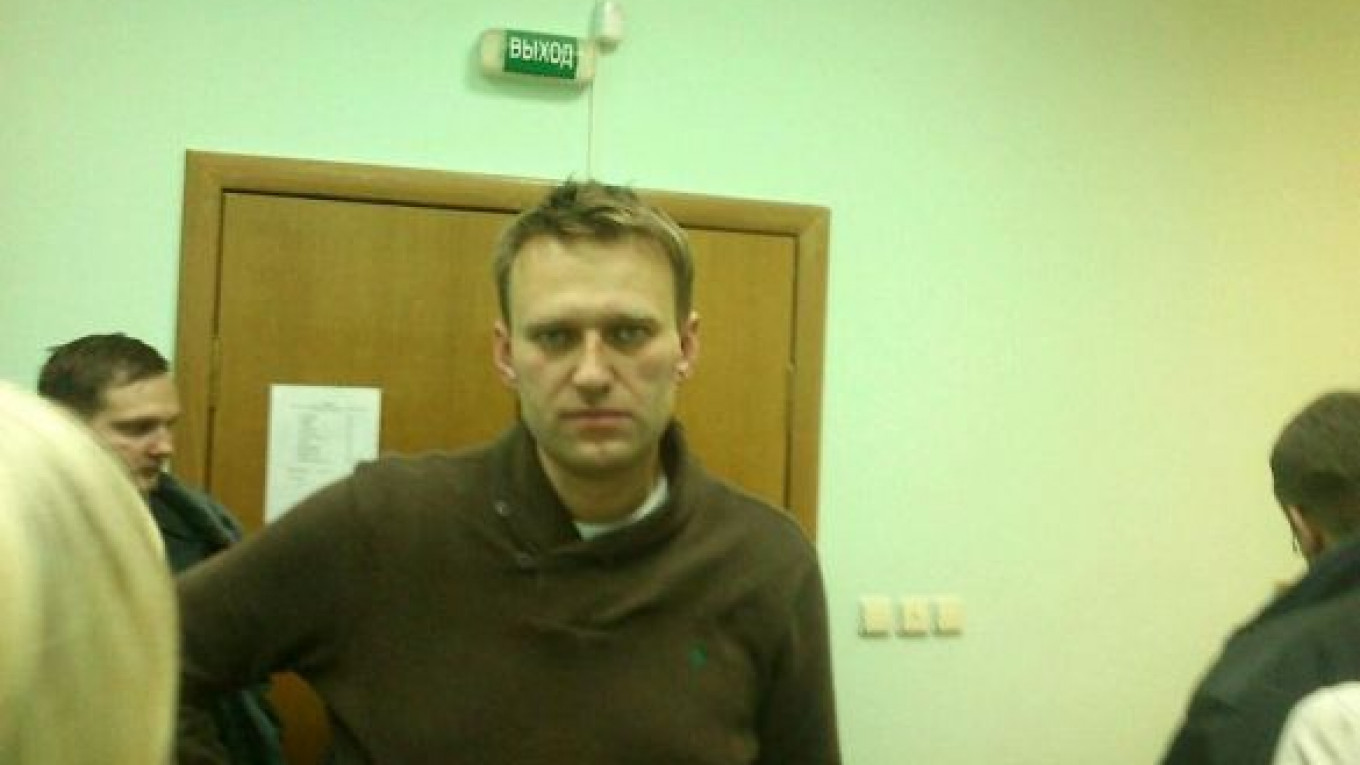Investigators have summoned opposition leader Alexei Navalny to face charges Monday in connection with his work with Kirov’s governor in 2009, a once-dead case that seems to have taken on new life after Navalny accused Russia’s top investigator of concealing business interests.
Navalny, the scourge of the Kremlin for galvanizing opposition protesters and of state companies for his anti-corruption blogging, is supposed to arrive at the Investigative Committee’s office at 4 p.m. to be charged with causing a state company to incur financial losses in the Kirov region in August 2009, his lawyers said.
One of his lawyers, Olga Mikhailova, said she feared that Navalny would be taken into custody immediately, noting that her client had been questioned for several hours at previous meetings with investigators and that the lateness of the hour of Monday’s meeting left little time for questioning, the New Times magazine on its website.
Also speaking in favor of his arrest is the renewal of the Kirov investigation, which was reopened in May after being closed in January 2011 for lack of evidence, Mikhailova said.
“Now, in just two months, they have made him a defendant,” she said. “What for? It is clear that the goal is to pass the case to court.”
An inquiry faxed to the Investigative Committee on Friday went unanswered.
Navalny is accused of pressuring the KirovLes timber firm into a disadvantageous contract while serving as an adviser to Kirov Governor Nikita Belykh. If charged and convicted, he faces up to five years in prison.
Legal amendments signed by former President Dmitry Medvedev in April 2010 allow courts to arrest people suspected of economic crimes only in extraordinary cases. In March 2011, Medvedev signed legislation eliminating prison terms as mandatory punishment for a range of economic crimes.
But Navalny lawyer Vadim Kobzev said his suspects in such cases would be asked at the very least to sign a pledge not to leave town. But, he said, “in our case I understand that common logic doesn’t work, and anything could happen,” Interfax reported.
Opposition lawyer Vadim Prokhorov, who is not involved in Navalny’s case, said the court usually hands out prison terms for the charges that Navalny faces, the New Times said.
Navalny angered Investigative Committee chief Alexander Bastrykin last week by publishing documents that appear to support a 2008 news report that accused Bastrykin of concealing real estate and business interests in the Czech Republic in violation of the rules for state officials.
The report, written for Moskovsky Komsomolets by Alexander Khinshtein, a United Russia deputy in the State Duma, said Bastrykin had been registered as the co-owner of a real estate company called LAW Bohemia in the Czech Republic since 2000, even though in July 2001 he was appointed head of the Justice Ministry’s branch in the Northwest Federal District, which required him to step down as the firm’s director.
Navalny, who is a board member of Aeroflot, published documents on his blog Thursday that indicate Bastrykin held Czech residency from 2007 to 2009 and bought property and managed a company there. Navalny noted on his LiveJournal blog a report in the Financial Times that the Czech Interior Ministry had confirmed that Bastrykin had held residency in the country.
Bastrykin, who was appointed to the Investigative Committee in 2006, rejected wrongdoing in an interview published Friday in Izvestia.
“If a single euro of my profit is found, I will resign,” he said.
Bastrykin said he had to set up the firm to purchase an apartment in Prague in 2000 because he had been planning to work as a visiting professor. He denied having a residence permit and said he had been issued a long-term visa. He added that the apartment now belongs to his first wife.
Vladimir Pribylovsky, an analyst with Panorama, a think tank, said Navalny was “brilliantly” using a clan war between the Investigative Committee and the Prosecutor General’s Office to boost his reputation as a corruption fighter.
A simmering conflict between the Investigative Committee and the prosecutor’s office spilled into the open after they were separated into independent agencies in January 2011.
Should Navalny be arrested, his popularity would soar to that of Nelson Mandela or Mahatma Ghandi, Pribylovsky said, adding that the decision on his arrest would be made by President Vladimir Putin, not Bastrykin.
A Message from The Moscow Times:
Dear readers,
We are facing unprecedented challenges. Russia's Prosecutor General's Office has designated The Moscow Times as an "undesirable" organization, criminalizing our work and putting our staff at risk of prosecution. This follows our earlier unjust labeling as a "foreign agent."
These actions are direct attempts to silence independent journalism in Russia. The authorities claim our work "discredits the decisions of the Russian leadership." We see things differently: we strive to provide accurate, unbiased reporting on Russia.
We, the journalists of The Moscow Times, refuse to be silenced. But to continue our work, we need your help.
Your support, no matter how small, makes a world of difference. If you can, please support us monthly starting from just $2. It's quick to set up, and every contribution makes a significant impact.
By supporting The Moscow Times, you're defending open, independent journalism in the face of repression. Thank you for standing with us.
Remind me later.






